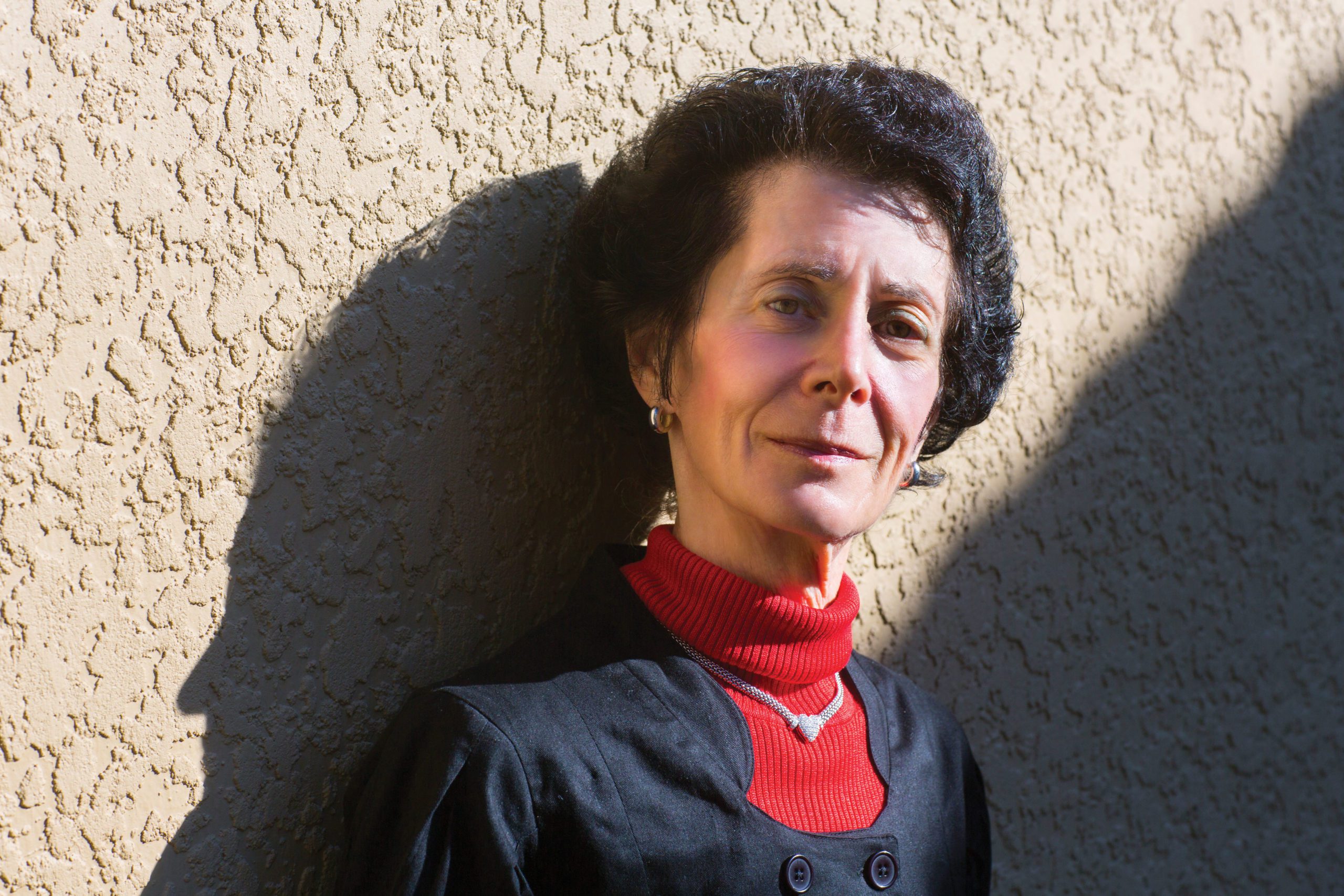Deena Baxter sits at the head of her dining room table, soft-spoken but not scared. She points to the cover of her new book.
An apple tree stands decidedly split, one half vibrant and fruitful and rooted in a red heart, the other bare and black and anchored by the silhouette of a mottled face shedding a single tear.
“When you have sudden loss, your life gets bifurcated,” she explains. “You can cling to these dead branches here, and you do for a while, because you just can’t believe your loved one is gone so instantaneously. But what will happen is, as the tree dies, it will take you down. Or, you can embrace the living part of the tree.”
She chose the second path. Surviving Suicide: Searching for “Normal” with Heartache & Humor details Baxter’s experience after she lost her stepson of 31 years to suicide in 2012. Instead of folding up into the new and uninvited void, she chronicled her love, hurt and hope in an effort to honor her child and help others.
She found renewed purpose in The Surviving Suicide Project, an admirable crusade through the book and an accompanying website that she initiated in partnership with the National Alliance on Mental Illness (NAMI) of Collier County, also its beneficiary.
For those struggling to choose the path she did, she presents openly in the book each trying experience, every raw ache and honest reaction, and all the admitted laughter she managed to find. For others in healing, she has further advice and compassion. For humanity at large, she urges research and reform to make communities safer and more accepting. And for those with mental illness, she writes to wash away the stigma they bear.
*
The call played out as in a film script, the unexpected, utterly nightmarish scene where your stomach plummets and your hand flies to your mouth. July 5, 2012, just three weeks before Kevin’s 36th birthday. It came from his landlord in Brazil. Baxter answered.
“You just go into just a state of, ‘Huh?’ You just kind of hang there,” she says. First, disbelief. Shock.
Then, Deena Baxter the Organizer surfaced, a version in slow motion. She remarkably thought to ask important questions, to exchange information—to compose herself before delivering the shattering words to her husband, Adam.
“For three weeks afterward, Adam went out to the mailbox every day, sure that there was going to be a full disclosure letter,” Baxter says. He crumbled. “He’s still waiting.”
She went into what she calls Program Management Mode, a nod to her past profession. She had to. On top of absorbing the crushing blow of the loss, processing the way it happened and carrying the burden of notifying Kevin’s father and two surviving brothers, many a cruel challenge would emerge: language barriers, cultural and time differences, other international obstacles (namely with the legal and health care systems), limited communication during the holiday weekend, clueless and insensitive “frenemies and wingnuts” from the woodwork, Adam already down for the count fresh from back surgery. No will left behind.
Later she would be knocked down again, by the Aurora, Colorado, shootings; the Sandy Hook tragedy; and the death of Robin Williams.
“You’re healing a wound, and the scab gets ripped right off of it,” Baxter says. “And, oh, does that hurt. Oh, does that hurt.”
*
You know the Peanuts character Pigpen, with all that swirl? That’s what it’s like living with a person that will not take responsibility for managing their health,” Baxter says.
Kevin’s bipolar disorder brought with it constant crises. In retrospect, he exhibited the classic signs. There was a family history of mental illness. He was the highest-maintenance of the three boys, obstinate from very young. He was bright. He was entitled. He racked up debt after debt, starting at 15, and didn’t worry about it. He neglected his graduate studies to travel the world, eventually boarding a plane to Brazil—unbeknownst to his parents—and never moving back. He envisioned himself as a mega land developer in Bahia, with no plan on how to achieve it.
“When there are those cycles of … mania and then the depression, oh my God. It can be extreme,” Baxter says. “The other thing that happens, you’re just trying to hold the boat steady when they’re surging, and we would see those—the aggression, the anger, the sleeplessness, the feeling omnipotent. The not looking backward to see the debris you’re leaving behind, the broken relationships, the tears, the heartache, the destruction, the tornados. The hail storms, the crops devastated. They don’t see that.”
His hasty marriage was “a disaster from the get-go.” He alienated employers, colleagues, classmates, family. He lost his job, more than once. The week he died, Baxter shares, he had interviews lined up, but it was getting tougher to sell his skills with widening gaps in his work history and dwindling positive references.
Baxter felt a common emotion: tremendous guilt. Could they have written a check to erase all his debt? Was there something else they should have said? Did she fail to protect her child? But in healing, she formed a new outlook: “Guilt is hopelessness looking for a home. Make it a short visit.”
She, and her husband, really had tried everything to help Kevin—by taking him to a psychiatrist stateside, by trying to help him find one in Brazil, by encouraging him to accept his illness and take medication, by giving him money, by not giving him money, through upbeat emails, through tough love, by Baxter coaching him on business plans and branding just as she would have one of her clients. If she saw he was calling, she would drop anything and everything to answer.
“Was it enabling? Yes. Would I do it again? Absolutely,” she says.
She’s now in the “terrible 2s” of her grief journey, she says, “complete with the ‘Whys’ the ‘Nos’ and the occasional hissy fit.” But it’s not in her nature to sit in pain.
And to those who know her, like her friend of more than a decade Kati Griffith—who has lost two friends to suicide—it’s not surprising she has written a book.
“She doesn’t just come up with ideas; she does what she thinks should be done,” Griffith says. “So she’s sort of a dynamo all by herself.”
Baxter loves her husband for understanding her need to put their trials on paper, she says, and her effort to make meaning of them respectfully. Because it never would have been his first choice, to display a wound that will never heal.
*
When Baxter entered the office of NAMI CEO Kathryn Leib-Hunter three weeks into her bereavement, she looked physically defeated, Leib-Hunter says. When she left, she looked physically released of the weight of the world.
She had gone in seeking comfort and advice from a knowledgeable friend, and left passionate and excited. Somewhere in between the tears and the laughter, the light bulb came on.
She would write a book, and NAMI would get the proceeds. Likely very few of us would turn our grief into honor and advocacy. But that’s exactly what Surviving Suicide and its companion website, writeonmymind.com, do.
“Deena wanted to immediately put her energy—which she has a tireless amount of—into a tool for helping others,” Leib-Hunter says.
“How would I want to be remembered? That’s what I used as my guide,” Baxter says. “You know, instead of, ‘What would Jesus do?’ ‘What would Kevin want?’ That and some Gandhi and also the Hippocratic thing, first do no harm. I really tried to honor his memory as the positive part of him. Because there certainly were positives.”
The first part of the book intimately details her family’s navigation of loss and all the pain and pandemonium that have come with it. A roller coaster of sorrow, anger, guilt, depression, uncertainty, surprising amusement and hope unfold on its pages, which are interspersed with poignant quote “timeouts,” pictorial “commercial breaks”—and illustrations by none other than NAMI artists.
“She pulled other people into it,” Griffith says. “She does that.”
Baxter dreamed of devoting a closing section to healing through art and humor. Humor is evident in every step Baxter takes, Leib-Hunter says, so, naturally, her approach to life found its way into her text. But she contacted Leib-Hunter about getting the designs from adults and adolescents who live with or are impacted by mental illness. What resulted were images Baxter found too beautiful and fitting not to embed and credit throughout the entire story.
From there her platform snowballed into the website, where anyone can submit and access artwork, poetry, prose, video, news items and other life-affirming resources. It’s tagged as “A safe place for the mind to speak: Giving mental illness a voice.”
“I want to be Deena when I grow up,” Leib-Hunter jokes. “I want to continue to have the passion that she provides and the professionalism that she provides in everything she touches.”
Part two of the book brings broader meaning to the Baxters’ experience through commentary on society’s approach to mental illness. She extends her plea for acceptance and change to the bottom line-minded health care system, “the crazier, the better” entertainment world and proverbial schoolyard.
“Think about a diagnosis of cancer,” she says. “That used to be in the darkness. Today you would never think of making fun of someone with cancer. But we do that with mental illness.”
Baxter also speaks everywhere from libraries to country clubs to share what she’s learned, and teaches meditation to help others through their personal traumas as it helped her.
Inspiring in her strength is that she remains expressly grateful. For the NAMI artists who shared their private visions, for her family’s support, that the harm her stepson caused others was never physical, for her life of business skills that helped her every step of the project, for the instructive State Department website and her “angel” at the U.S. Embassy in Brazil who never even took off her coat before plunging into dedicated guidance, for the good times with Kevin, and for the opportunity to help others while she heals herself.
NAMI of Collier County
• Services: information and referrals; adult drop-in center; support groups; seminars; school-based education programs; crisis, caregiving, new mental health employee, behavioral health and empathy trainings; identification system; funds for consumer care; coaching on self-directed care; and access to community and peer support
• Cost: free
• Reach: about 12,000 people annually




